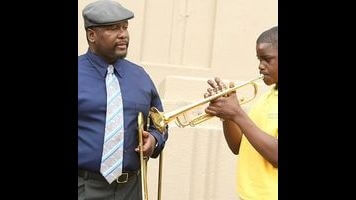Treme: "Meet De Boys On The Battlefront"

On the morning the first episode of Treme aired last week, the New Orleans Times Picayune ran an editorial by creator David Simon. It opens thusly:
In the first episode of "Treme," to be broadcast tonight on HBO, a character will reach into her purse and produce an apple-flavored Hubig's pie. She will do this in late November 2005. With the rest of her dessert menu no longer available, the character, a local chef, will then serve the local delicacy to a patron of her restaurant. We offer this bit of information freely, as Exhibit A in what will surely become a long list of cited inaccuracies, anachronisms and equivocations through which New Orleanians reassure themselves that not only is our little drama a fiction, but that those who have perpetrated this fiction are indifferent to facts, chronologies, historical possibilities.
Getting New Orleans “right” has long been a sensitive subject for locals, who have seen their city continually reduced (hello, K-Ville) to a garish playground of voodoo rituals and suspect accents, or frequently a place that doesn’t exist at all beyond Bourbon Street. Simon’s column cagily plays on the suspicions of New Orleanians by confessing a minor inaccuracy (and pre-confessing minor inaccuracies to come) in order to assert the show’s commitment to getting the city as right as it can. And if any outsider has a chance to pulling it off, it’s Simon, whose obsessive attention to detail—manifested most recently in the heavy (and untranslated) military lingo that suffused Generation Kill—is perhaps his defining characteristic. If he can achieve authenticity—in the casual and professional language of his characters, in the general backdrop, in the particularities of things like music and government bureaucracy—the rest will fall into place.
Treme’s second episode, “Meet De Boys On The Battlefront,” confirms that authenticity isn’t just a goal of the show, but a major theme of it as well. Local sensitivity about what constitutes “the real New Orleans”—as opposed to the touristy crap on Bourbon Street—comes up at several points during the hour, particularly in a subplot involving three freshly scrubbed young people from Madison, Wisconsin who are in town to have fun and help out flood victims with their church group. Naturally, these earnest folks meet with some condescension, if not downright contempt, from people like Steve Zahn’s Davis, whose primary mission as a DJ is to purge New Orleans standards in favor of more underground jazz artists, and Sonny (Michiel Huisman), a street musician who’s one “When The Saints Go Marching In” request away from strangling a tourist.
It’s easy to read the show’s commitment to honoring “the real New Orleans” as contempt for the rubes who can’t be bothered to explore beyond the French Quarter. When Sonny bitterly castigates the Wisconsinites (“You ever heard of the ninth ward before the storm? So why are you so fired up about it now?”) for their well-meaning cluelessness, he demonstrates that strain of contempt. And we see it later, too, when Davis, overstepping his role as clerk at a French Quarter hotel, sends the trio out to a 7th Ward jazz club colorfully named “Bullets.” But before condemning the show for echoing these sentiments, it’s important to remember that Sonny and Davis are acting like assholes here. Their assholishness comes from a good place—a love for the unheralded or neglected corners of their city—but it’s nonetheless unfair to outsiders who really are curious about the place and want to help out where they can. Consider Sonny’s partner Annie (Lucia Micarelli) in that very first scene: Sonny’s behavior embarrasses her, and clearly doesn’t represent the impression she wants the city to leave on these visitors. I suspect the differences between these two New Orleans—and those feisty characters like Davis, Sonny, and Creighton (John Goodman) who draw the battlelines—will crop up insistently throughout the series, but I think it’s more nuanced than some critics have given it credit for being.
Elsewhere, “Meet De Boys On The Battlefront” deals beautifully with residents trying to settle back in and rebuild their lives, but without the means to do it. Janette (Kim Dickens) operates a successful restaurant—and scorched eggs aside, appears to be a marvelous chef—but there she is, humbling herself in front of her parents, to get the money necessary to make repairs and get the business going full steam again. Janette’s reaction when her father offers a number woefully short of what she needs is a killer: You’d expect her to gnash her teeth or at least show some flicker of disappointment, but she swallows hard and graciously accepts this little pebble in the pond. Like several of the characters in Treme, Clarke Peters’ Albert Lambreaux being chief among them, she’s nothing if not doggedly optimistic.
Also scraping by are Antoine (Wendell Pierce) and Davis, who also have to muster the humility to choke down jobs that are far from what they’d really like to do. Antoine claims to have a job backing Kermit on trombone, but his girlfriend Desiree reminds him that “a gig is not a job” and they’ve got a baby daughter to worry about. So while he lives for playing with a legend (“You come home smelling every week like cigarettes and pussy,” complains Desiree. “Kermit’s barbeque tastes right, but not that right.”), he also has to shuffle off to Bourbon Street to brass up a strip joint. He’s told repeatedly that there’s “no shame” in playing Bourbon Street, but he reads it differently. For his part, Davis takes the hotel clerk job, but looks hilariously out of sorts in the position; he’s the kind of guy who looks like he’s never worn a suit in his life, and he’s the last man on earth to be directing yahoos to Bourbon Street.
 Keep scrolling for more great stories.
Keep scrolling for more great stories.
